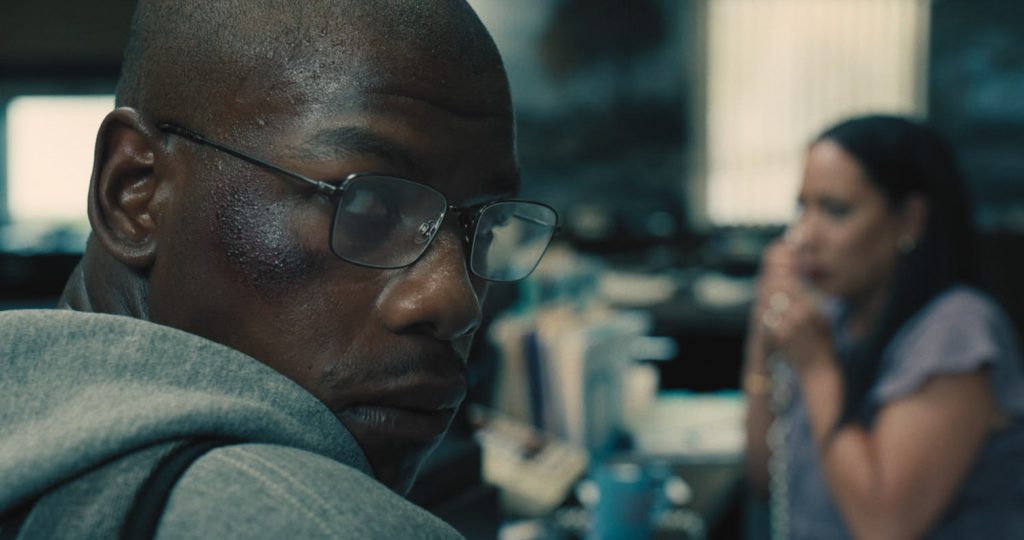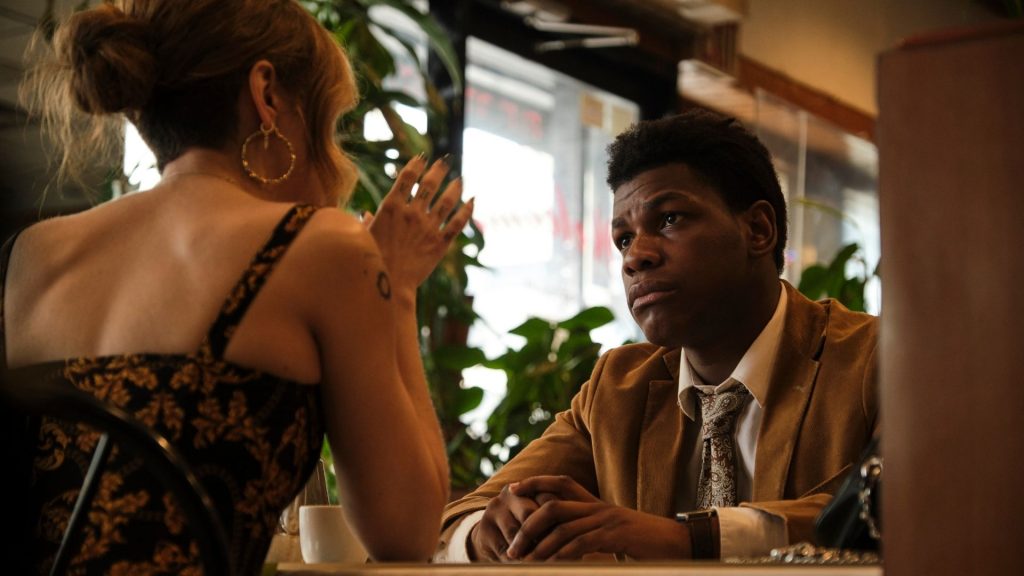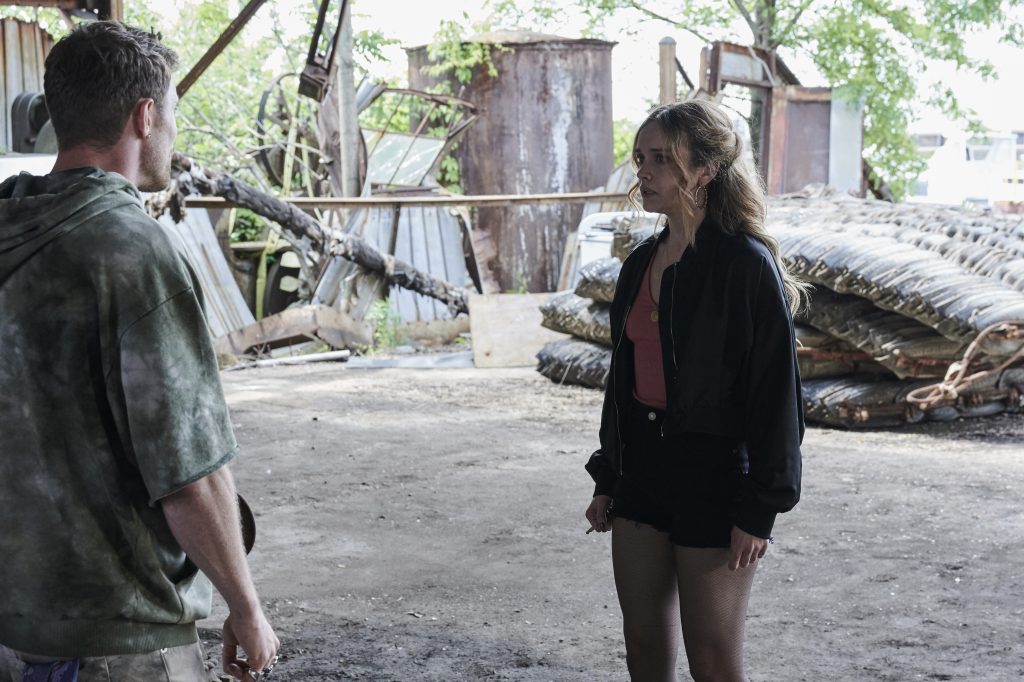September 10, 2022
by Carla Hay

Directed by Gina Prince-Bythewood
Culture Representation: Taking place in the mid-1800s in West Africa, the action film “The Woman King” features a predominantly black cast of characters (with some white people) representing the working-class, middle-class, wealthy and royalty.
Culture Clash: General Nanisca leads an all-female group of warriors in the African kingdom of Dahomey, as they battle against the slave trade and the rival Oyo Empire.
Culture Audience: “The Woman King” will appeal primarily to people who are fans of star Viola Davis and military action movies that are told from a female perspective.

“The Woman King” is sometimes cluttered and uneven, but the movie’s compelling performances, gripping action and inspiring personal stories can keep most viewers interested. Viola Davis is the movie’s title character and should have been in more scenes. Instead, at least half of the movie is about a rookie military recruit, who starts out as an underestimated newcomer and overcomes challenges, on and off the battlefield. “The Woman King” had its world premiere at the 2022 Toronto International Film Festival.
Directed by Gina Prince-Bythewood and written by Dana Stevens, “The Woman King” is inspired by true events that happened in West Africa in the mid-1800s. Davis (who is one of the producers of “The Woman King”) portrays General Nanisca, the leader of the Agojie, an all-female group of warriors protecting the African kingdom of Dahomey.
These women have a fearsome and bold reputation that is so widespread, when they arrive as visitors in a village, people are afraid look at them. Some of these warrior women’s exploits are exaggerated in stories told among villagers, while other exploits are not exaggerated, including the warriors’ participation in vicious killings. For example, the movie shows how the women specifically train themselves on how to murder people by chopping off their heads.
King Ghezo (played by John Boyega), the reigning leader of Dahomey, is part of the kingdom’s dwindling male population. Dahomey has been in a longtime feud with the Oyo Empire, which is also in West Africa. The on-again-/off-again warfare between Dahomey and Oyo has resulted in Dahomey being forced to give up male residents to Oyo, which has been selling these men in the growing slave trade.
Needless to say, the slave traders (the African traitors and the white male buyers) are the story’s biggest villains. Leading the group of white slave traders is Santo Ferreira (played by Hero Fiennes Tiffin), a Brazilian aristocrat who tries to convince King Ghezo to start profiting from the slave trade by selling slaves directly to Santo and his colleagues. King Ghezo needs the money, and the movie ultimately shows whether or not he makes the decision to sell out his own people. Someone who does sell his own people with no hesitation is Oba Ade (played by Jimmy Odukoya) from the Oya Empire.
Meanwhile, in Dahomey, a 19-year-old woman named Nawi (played by Thuso Mbedu) defiantly refuses to marry an older, wealthy man whom her father has chosen for her. This would-be husband immediately shows that he’s abusive when he punches Nawi for not being submissive to him. Nawi defends herself by pushing this abuser down to the ground. He’s shocked that she won’t let him get away with abusing her.
Nawi tells her father that she doesn’t want to have a husband and that she wants to be a soldier. And so, Nawi’s father decides he’s going “punish” her by making her enlist in the toughest military unit around: the Agojie army. Nawi arrives as very physically unprepared and insecure new recruit. She tries to hide her insecurity by acting like she knows more than she really does.
Nanisca gives the responsibility of training Nawi to Nanisca’s right-hand woman Izogie (played by Lashana Lynch), who is as fearless as Nanisca and very loyal to her. Another member of this military unit is Amenza (played by Sheila Atim), who has known Nanisca the longest and is Nanisca’s closest confidante. Amenza is compassionate as well as tough. Lynch and Atim are entirely believable in these supporting roles.
Nawi doesn’t make a good impression on the Agojie leaders because she often acts like an entitled brat. In one of the first conversations that Nawi and Nanisca have with each other, Nanisca comments that Nawi looks a lot younger than 19. Nawi says to Nanisca, “You look like an old woman to me.”
The movie has the expected scenes of inexperienced recruit Nawi making mistakes and failing in some physical challenges during the training process. She’s laughed at and taunted by some of the other trainees, but she doesn’t experience any extreme military hazing. It should come as no surprise that Nawi eventually improves (in her attitude and physical skills) and then excels. Mbedu is quite good in depicting Nawi’s metamorphosis.
Izogie ends up relating to Nawi because they both came from dysfunctional families. Izogie, who knows about Nawi’s abusive father, confides in Nawi one day by saying that Izogie experienced the pain of having an abusive mother. Izogie comments to Nawi about the Agojie warriors: “You have a new family now.”
Meanwhile, Brazilian slave trader Santo has a servant named Malik (played by Jordan Bulger), whose biracial identity often tests his loyalty. (Malik’s mother was an enslaved black woman, and his father was white.) Malik often has to choose between his white employer and the black people with whom Malik identifies with more. Malik and Santo are about the same age, and they grew up together, with Malik always having the role of Santo’s servant.
Malik and Nawi become attracted to each other, but their possible romance is hindered by Nawi’s doubts about how involved Malik is in the slave trade. Malik repeatedly tells Nawi that he’s not a slave trader, but she questions his honesty, considering that he works for a slave trader. To bring some playfull sexiness into the movie, there’s a scene where Nawi takes away Malik’s clothes as a prank when he’s skinny dipping by himself near a waterfall.
Wait a minute. Isn’t this movie called “The Woman King,” not “The Woman Rookie”? One of the frustrating aspects of “The Woman King” is that the Nanisca isn’t in the movie as much as she should be. Nanisca is not exactly sidelined, because Davis is such a powerhouse performer, she makes the most of her screen time, even with her facial expressions. However, a huge part of the story is about Nawi’s personal dramas.
The movie becomes a little bit of a soap opera when something from Nanisca’s past comes back to haunt her. It’s a secret that Nawi finds out about in a way that shakes Nawi to her inner core. Very few people know about this secret. And, at first, Nawi doesn’t quite believe this secret until she sees proof.
“The Woman King” can be commended for showing some of the realistic ups and downs that military groups have with each other and with the governments that they serve. Nanisca has some tension with King Ghezo’s opinionated wife (played by Jayme Lawson), who thinks that Nanisca is too radical. It irritates King Ghezo’s wife when he takes Nanisca’s advice.
The power struggle between Nanisca and King Ghezo’s wife doesn’t become a major showdown though, because the king always treats his spouse as more or less a trophy wife. It’s very obvious from the beginning of the movie that King Ghezo has more respect for Nanisca than his wife, when it comes to leadership skills and camaraderie. Doesn’t the title of this movie say it all?
“The Woman King” has some intense battle scenes and depictions of enslavement that might be too hard to watch for very sensitive viewers. The battle scenes show how even though many of these women might be physically smaller than their male opponents, the female warriors have trained to outwit their opponents with strategic fight moves. The movie also makes a point of how the women pay respect to their fallen comrades using their African religious traditions.
Although “The Woman King” has a well-developed story arc for Nawi, the development of the Nanisca character sometimes fall short of what many viewers might expect. Nanisca gives a little bit of background information about herself, including her secret that affects Nawi. Even with this big secret revealed, Nanisca still remains stoic and somewhat mysterious by the end of the movie.
Viewers never really find out what Nanisca’s interests are outside of this army of female warriors and the army’s duties to protect Dahomey, but that could be the point: Nanisca’s life revolves around this group. It’s testament to Davis’ immense talent that she conveys enough of a personality with Nanisca to show that this extraordinary warrior is not a hollow character but has lived a life of pain and hard-fought survival that she doesn’t easily reveal to others.
TriStar Pictures will release “The Woman King” in U.S. cinemas on September 16, 2022.




